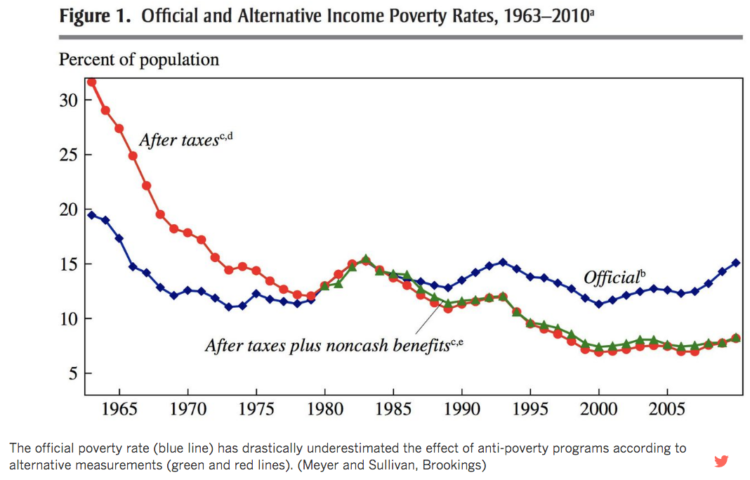"The answer is “probably”, but by less than you might assume. The LA Times has an interesting article entitled:
New evidence shows that our anti-poverty programs, especially Social Security, work wellI’m not quite convinced by this argument. The article discusses some very interesting research by Bruce D. Meyer and Derek Wu, which shows the poverty rate looking at only official income data, and then again after accounting for taxes and various income support programs. I’m convinced by their argument that poverty, properly measured, has fallen rather sharply over time. There are clearly far fewer poor people in America than when I was young (in 1960).
Indeed research by Bruce Meyer and James Sullivan produced another similar graph that I included in this post, which shows that the consumption poverty rate has fallen to extremely low levels, below 5%. I like that graph so much I included it in the new principles textbook that I am working on.
And yet, none of this tells us about the causal impact of poverty programs. The first time I ever spoke up in a college econ class (back in 1974), was to challenge my professor on exactly this point. He showed data on the income distribution before and after transfers, and argued that this showed the impact of transfers. I raised my hand and suggested that without transfers, low-income people would probably have more market income. (He graciously conceded the point.)
For instance, if there were no Social Security program, older people would be more likely to keep working beyond age 65. Having said that, I would also like to make the following two points:
1. Even if Social Security does not raise the income of the elderly, it quite likely makes them better off. Many old people would prefer to spend their final years enjoying life, not working at Walmart, or at least working less than full time.
2. I do think it likely that Social Security did reduce poverty, as the offset of fewer hours worked and less market income is likely less than 100%.
When you look at poverty programs for the non-elderly, things get a bit murkier. It is certainly plausible that they have also reduced poverty, but it’s hard to prove. While poverty has declined sharply since the 1950s, it’s important to keep in mind several factors:
1. Much of the fall in the official poverty rate occurred prior to 1966, before the Great Society programs were fully implemented.
2. Even without poverty programs, you would have expected a sharp fall in poverty because of economic growth. Per capita GDP is much higher than in the 1950s.
Consider a family of illegal immigrants from Latin America, where both the husband and wife work full time. What is the poverty rate among that sort of family? I suspect it’s pretty low. And yet that family does not qualify for government income transfers.
So here’s the $64,000 question. To what extent have poverty programs caused different labor market behavior among America’s native-born poor, as compared to that hypothetical immigrant family? I don’t know. How many single moms who are on welfare would instead be married and working as hotel maids if welfare was not currently available? I don’t know. What if welfare had never been available over the past 50 years? I don’t know, and I don’t even know of any way to find out. We should be very modest about our ability to answer these sorts of questions."
Friday, June 22, 2018
Do poverty programs reduce poverty?
By Scott Sumner.
Subscribe to:
Post Comments (Atom)

No comments:
Post a Comment
Note: Only a member of this blog may post a comment.